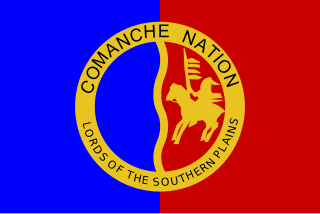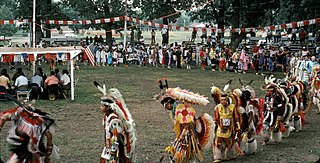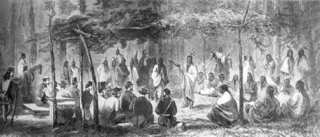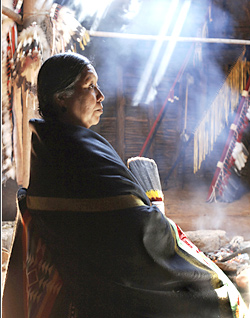Related Research Articles

The Comanche are a Native-American nation from the Great Plains whose historic territory consisted of most of present-day northwestern Texas and adjacent areas in eastern New Mexico, southeastern Colorado, southwestern Kansas, western Oklahoma, and northern Chihuahua. Within the United States, the government federally recognizes the Comanche people as the Comanche Nation, headquartered in Lawton, Oklahoma.

Walters is a town in Cotton County, Oklahoma, United States. The population was 2,551 at the 2010 census. The city, nestled in between twin creeks, is the county seat of Cotton County. The city's motto is "Small town; Big heart."

Kiowa people are a Native American tribe and an indigenous people of the Great Plains of the US. They migrated southward from western Montana into the Rocky Mountains in Colorado in the 17th and 18th centuries, and finally into the Southern Plains by the early 19th century. In 1867, the Kiowa were moved to a reservation in southwestern Oklahoma.

A pow wow is a social gathering held by many different Native American communities. A modern pow wow is a specific type of event for Native American people to meet and dance, sing, socialize, and honor their cultures. Pow wows may be private or public. There is generally a dancing competition, with many different types of traditional dances, music and regalia, often with significant prize money awarded. Pow wows vary in length from a one-day event, to major pow wows called for a special occasion which can be up to one week long.

Quanah Parker was a war leader of the Quahadi ("Antelope") band of the Comanche Nation. He was born into the Nokoni ("Wanderers") band, the son of Comanche chief Peta Nocona and Cynthia Ann Parker, an Anglo-American who had been kidnapped as a child and assimilated into the tribe. Following the apprehension of several Kiowa chiefs in 1871, Quanah emerged as a dominant figure in the Red River War, clashing repeatedly with Colonel Ranald S. Mackenzie. With European-Americans deliberately hunting American bison, the Comanches' primary sustenance, into extinction, Quanah eventually surrendered and peaceably led the Quahadi to the reservation at Fort Sill, Oklahoma.

The Medicine Lodge Treaty is the overall name for three treaties signed near Medicine Lodge, Kansas, between the Federal government of the United States and southern Plains Indian tribes in October 1867, intended to bring peace to the area by relocating the Native Americans to reservations in Indian Territory and away from European-American settlement. The treaty was negotiated after investigation by the Indian Peace Commission, which in its final report in 1868 concluded that the wars had been preventable. They determined that the United States government and its representatives, including the United States Congress, had contributed to the warfare on the Great Plains by failing to fulfill their legal obligations and to treat the Native Americans with honesty.
Indigenous music of North America, which includes American Indian music or Native American music, is the music that is used, created or performed by Indigenous peoples of North America, including Native Americans in the United States and Aboriginal peoples in Canada, Indigenous peoples of Mexico, and other North American countries—especially traditional tribal music, such as Pueblo music and Inuit music. In addition to the traditional music of the Native American groups, there now exist pan-Indianism and intertribal genres as well as distinct Native American subgenres of popular music including: rock, blues, hip hop, classical, film music, and reggae, as well as unique popular styles like chicken scratch and New Mexico music.
The Cozad Singers are a Kiowa drum group from Anadarko, Oklahoma. The group was founded by Leonard Cozad, Sr. in the 1930s, and consists of Leonard, his sons, grandsons, and other members of the family. Cozad, as they are commonly known, are southern style pow-wow and gourd drum, and have released several albums. They performed on the 2001 Grammy Award for Best Native American Music Album winning Gathering of Nations Pow Wow album, along with 15 other drum groups. Their most recent album, California Pow Wow, was released by SOAR Records in June, 2004, and won the 2005 Native American Music Award for Best Historical Recording.

Fancy dance, Pan-Indian dancing, Fancy Feather or Fancy War Dance is a style of dance some believe was originally created by members of the Ponca tribe in the 1920s and 1930s, in an attempt to preserve their culture and religion. It is loosely based on the War dance. Fancy dance was considered appropriate to be performed for visitors to reservations and at "Wild West" shows. But today, fancy dancers can be seen at many powwows across the nation and even the world.

The Plains Apache are a small Southern Athabaskan group who live on the Southern Plains of North America, in close association with the linguistically unrelated Kiowa Tribe. Today, they are centered in Southwestern Oklahoma and Northern Texas and are federally recognized as the Apache Tribe of Oklahoma.
The American Indian Exposition, held annually during the first full week in August at the Caddo County Fairgrounds in Anadarko, Oklahoma, is one of the oldest and largest intertribal gatherings in the United States. Sponsored by fifteen tribes, representatives from up to fifty other tribes participate in any given year.
Tom Mauchahty-Ware was a Kiowa-Comanche musician. He was known for his work playing the Native American flute, and has been a successful Indian dancer, and has sung in a popular blues band. He was also a skilled traditional artist: painting, sculpting, making flutes, bead working, and feather working. He was a descendant of the famous Kiowa flutist, Belo Cozad, and made two commercial recordings, Flute Songs of the Kiowa and Comanche (1978) and The Traditional and Contemporary Indian Flute of Tom Mauchahty Ware (1983).

The Gourd Dance is a social dance.

Dohäsan, Dohosan, Tauhawsin, Tohausen, or Touhason was a prominent Native American. He was War Chief of the Kata or Arikara band of the Kiowa Indians, and then Principal Chief of the entire Kiowa Tribe, a position he held for an extraordinary 33 years. He is best remembered as the last undisputed Principal Chief of the Kiowa people before the Reservation Era, and the battlefield leader of the Plains Tribes in the largest battle ever fought between the Plains tribes and the United States.
The Koitsenko was a group of the ten greatest warriors of the Kiowa tribe as a whole, from all bands. One was Satank who died while being taken to trial for the Warren Wagon Train Raid. The Koitsenko were elected out of the various military societies of the Kiowa, the "Dog Soldiers." They were elected by all the members of all the warrior societies of the entire tribe.
Spencer Asah was a Kiowa painter and a member of the Kiowa Six from Oklahoma.

Vanessa Paukeigope Santos Jennings is a Kiowa/Kiowa Apache/Gila River Pima regalia maker, clothing designer, cradleboard maker, and beadwork artist from Oklahoma.
Indian House is a Taos, New Mexico based record company specialized in traditional Native American Indian music in the United States and Canada. Founded in 1966 by Tony and Ida Lujan Isaacs, the Indian House catalog has now around 150 titles. The company originally issued recordings on phonodisc and cassette tape, however almost all albums are now available in the CD format.
David Emmett Williams was a Native American painter, who was Kiowa/Tonkawa/Kiowa-Apache from Oklahoma. He studied with Dick West at Bacone College and won numerous national awards for his paintings. He painted in the Flatstyle technique that was taught at Bacone from the 1940s to the 1970s.
Tahnee Ahtoneharjo-Growingthunder is an American Kiowa, Muscogee, and Seminole beadwork artist, regalia maker, curator, and museum professional from Mountain View, Oklahoma.
References
- Broughton, Simon and Ellingham, Mark (2000). Rough Guide to World Music Volume Two: Latin and North America, theCaribbean, Asia & the Pacific. ISBN 1-85828-636-0.
- Carney, George and Foley, Hugh Jr. (2003). Oklahoma Music Guide: Biographies, Big Hits, and Annual Events. ISBN 1-58107-104-3.
- Smithsonian National Museum of the American Indian, Resource Center.